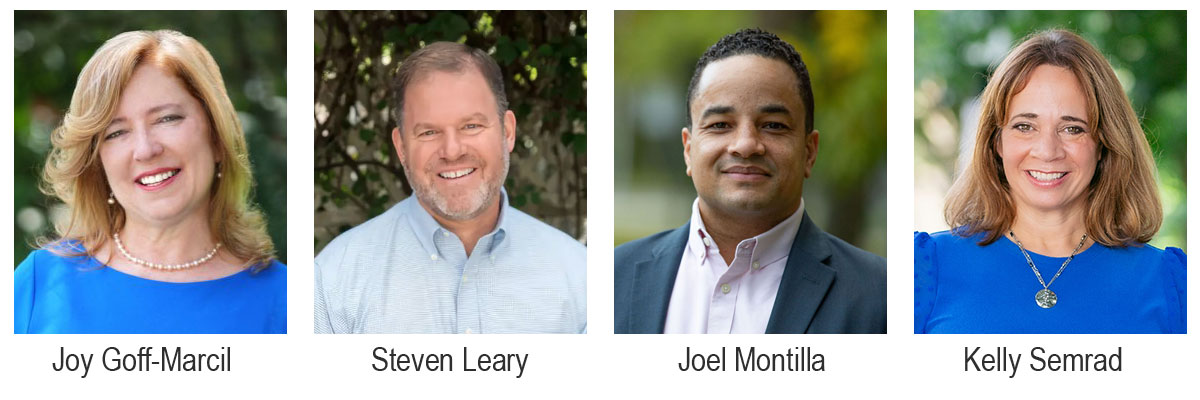
Let us hear your questions for County Commission District 5 candidates
The four candidates for the seat that represents Winter Park will appear at a public forum on Aug. 6
July 24, 2024
Staff Report
Voters will have the chance to hear directly from Orange County Commission candidates for District 5, which represents Winter Park, at a public forum on Aug. 6 at Westminster Winter Park.
The event at 7 p.m. is sponsored by the Orange County League of Women Voters and will be moderated by Winter Park Voice Editor Beth Kassab. Doors will open at 6:30 p.m. at Westminster, 1111 S. Lakemont Ave.
The public can also tune in live to watch the forum or watch a recorded broadcast on the League’s Facebook page. 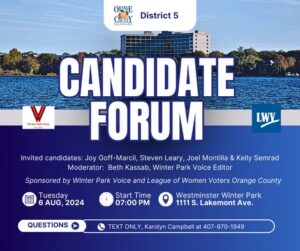
What questions do you have for the candidates who will be on the Aug. 20 ballot? You can leave them in the comment section below or email WinterParkVoiceEditor@gmail.com.
Vying for the technically non-partisan seat are: Former Maitland City Council member and former legislator Joy Goff-Marcil; former Winter Park Mayor Steve Leary; attorney Joel Antonio Montilla and Kelly Semrad, a UCF associate professor of tourism economics.
Key issues in the race include how to spend the county’s Tourist Development Tax, a levy on hotel beds; how to protect rural lands; policies for improving the region’s overcrowded roads and other transportation woes and more.
The winner will replace Emily Bonilla, who has reached term limits for her seat.
If none of the four candidates receives 50% plus one of the vote in August, then the top two vote getters will face off in November.
What else is on your Aug. 20 ballot? Take a look here.
Requests to cast a mail ballot must be made by Aug. 8 at 5 p.m.
The Orange County Supervisor of Elections office reported that it has received more than 90,000 requests for mail-in ballots so far. That is below the 214,555 requests for the primary in 2020 and 195,935 in 2022.
The lagging number this year is the result of a change in state law by the Florida Legislature, which now says that vote-by-mail requests expire after each federal election cycle and voters must re-submit those requests.
WinterParkVoiceEditor@gmail.com

Winter Park lifts prohibition on Sunday morning alcohol sales
For years, the city has restricted the sale of alcohol on Sunday mornings until after 11 a.m.
July 24, 2024
By Beth Kassab
Winter Park grocery stores and restaurants offering a boozy brunch can soon get an earlier start on Sunday mornings.
The City Commission voted 4-1 to allow alcohol sales as early as 7 a.m. rather than 11 a.m., making the time consistent with the other six days of the week. Commissioner Craig Russell was the only dissenting vote.
Mayor Sheila DeCiccio said the change was prompted by grocery managers who complained about routinely confused and disappointed customers who stopped in early on Sundays to stock up for a day at the beach or a football party only to learn they had to come back later for beer and wine.
Planning & Zoning Director Allison McGillis said Maitland, Orange County and Seminole County all allow sales as early as 7 a.m. Orlando is an outlier with a 9 a.m. start time. A few years back, Winter Park prohibited liquor sales until noon, but the city changed the restriction to 11 a.m. to accommodate the mimosa and Bloody Mary crowd at local brunch spots.
A grocery store manager, who declined to say where he worked, spoke at the meeting in favor of the new earlier time.
“I have personally witnessed friends planning for beach outings, football or Mother’s Day and they can’t do the shopping,” he said. “Many employees and customers have asked why and I haven’t been able to give a good reason.”
Russell, in casting a vote against moving sales up to 7 a.m., said he saw no need for the change.
“I have a belief that Sunday is a day of rest. I say leave it alone,” he said. “… I wouldn’t’ look to compromise my principles on agreeing to something like this.”
Winter Park to keep property tax rate the same
Commissioners voted Wednesday to hold the same property tax rate for the 17th year in a row.
That means the millage rate will remain steady at 4.0923 mills, though tax revenue will increase because of rising property values. The proposed $214.6 million budget includes a 3% or $6 million increase over the current year as property taxes remain the key driver of growth in the city’s general fund.
WinterParkVoiceEditor@gmail.com
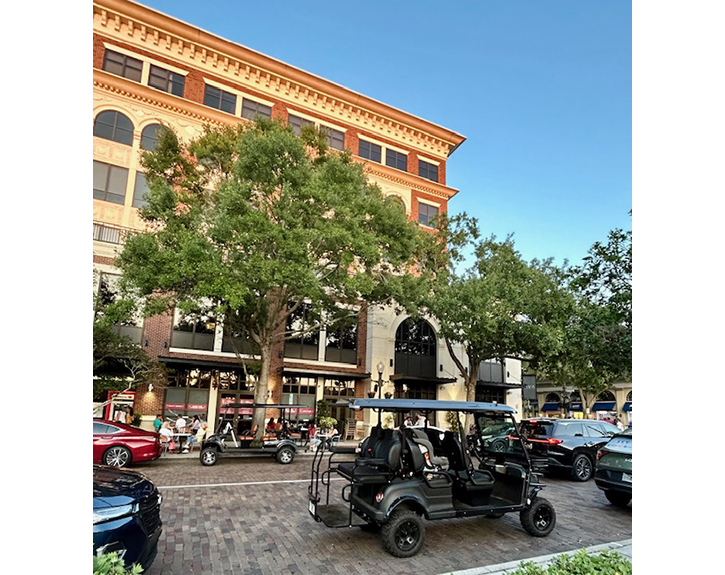
Golf carts are fun, but are they street-legal in Winter Park?
Here's what to know to about legal low-speed vehicles and how to avoid fines up to $500
July 17, 2024
By Charles Maxwell
Once only used along Central Florida’s fairways and greens, golf carts are now commonplace on Winter Park’s brick roads.
Residents like Jason Bristol find them a quick and easy way to travel to Park Avenue or even to Park Maitland School.
“I bought my first one back in 2005, and I’ve owned a total of five,” said Bristol, who lives in Baldwin Park. “I’ve been using it so long, I know all the backroads and take it everywhere- I’ve even valeted it downtown (in Orlando).”
But not everyone is as educated as Bristol when it comes to using the street legal version of golf carts known as low-speed vehicles.
That left city officials on a years-long campaign to make people aware of the difference and, more recently, for Mayor Sheila DeCiccio to ask the city attorney for a report on potential liability related to golf cart accidents.
Winter Park police chief Tim Volkerson and the department are actively working to remove golf carts from Winter Park roads.
“We went through a period of time where there was an influx of [illegal] golf carts being operated on the roadway,” Volkerson said. “While I do not have specific numbers, the agency did conduct an enforcement/education period, which was successful in reducing those operating golf carts on the roadway.”
The city posted a guide for residents to help them understand the differences between the legal and the illegal versions. Drivers can face up to $500 fines for operating an illegal cart on the roadway.
The street-legal kind must have a Vehicle Identification Number and features such as a seat belt for each seat, brake lights, turn signals, side mirrors and a windshield. Owners are required to have insurance and register the vehicles and operators must have a driver’s license.
They are permitted on city streets with a speed limit of 35 mph or less.
Standard golf carts don’t have all of those features, can be driven by anyone 14 and older and in most cities like Winter Park, can only be used on golf courses. (Some places, like the Villages, allow golf carts on roads.)
Volkerson says there have been no cases of severe injury or death involving a golf cart in Winter Park. But DeCiccio has monitored the situation closely and heard complaints from some residents about golf carts and LSVs.
In an article DeCiccio published last fall, she noted “the most common observation is the reckless driving and age of the drivers and occupants,” with residents claiming to have seen minors operating LSVs, with as many as six people per cart.
Bristol, who owns a street-legal cart and has five kids, said his family now much prefers taking their six-passenger LSV around town over their car.
And he’s noticed plenty of other people seem to have the same idea. Once one of only a few residents with an LSV in his neighborhood, he’s noticed their use on the rise: “Literally everyone has them now.”
WinterParkVoiceEditor@gmail.com

Growing a community: Residents advocate for public garden
City works with nonprofit affordable housing organization to improve volunteer garden program
July 17, 2024
By Zoey Thomas
When Rolesia Barton got a call from The Meadows Apartments approving her public housing application, her life changed.
“It literally saved me and my sons from the destitution of homelessness,” she said.
The U.S. Army veteran, 44, still lives at The Meadows with her two sons eight years later. A former South Carolina resident, Barton is always looking for ways to find community in Winter Park, she said. Two years ago, she found the perfect outlet: managing a community garden.
Barton now grows plants from habanero peppers to hibiscus flowers in her complex’s courtyard for residents to pick, cook and enjoy — for free. But the project hasn’t reached its full potential, she said. That’s largely because Barton funds the garden out of her own pocket.
After a trip to City Hall last month, Barton is working with city leaders to turn her garden from a passion project into a communitywide resource.
The Meadows, just west of the Ravaudage development off U.S. 17-92, opened in 1975 to house low-income Central Florida families. The building is one of six managed today by the city-supported nonprofit Winter Park Housing Authority.
Housing Authority management invited Fleet Farming, a nonprofit urban agriculture program, to deliver nine garden beds to The Meadows about three years ago, Barton said. But after the plots were set up in the building’s courtyard, no one took the initiative to care for them, she said.
“I was walking across the garden, and me and my son were walking past the bananas, and he was like, ‘Man, these bananas are going to die,’” she said. “And I said, ‘They just need food, and they’ll be all right.’”
The building manager at the time overheard Barton’s conversation and asked if she’d be interested in taking over the garden, she said. Barton jumped at the chance.
She originally had about 10 volunteers helping her, she said. But the number eventually dwindled until only Barton and her two teenage boys remained.
Barton didn’t give up. She continued working alone, turning the nine garden beds left by Fleet Farming into a sprawling 600-square foot horticultural expanse in two years.
“I want to put my foot in where I can see there’s something lacking,” she said. “You want some basil for your spaghetti, we’ve got it out here. You want lemongrass for your tea, we’ve got it out here. You don’t have to go and buy that stuff — it just helps people to save money.”
Barton went to her first City Commission meeting to ask for support in June. She got the idea after talking with Equity Council Corp president LaWanda Thompson for advice, she said.
Thompson, 46, is a longtime community advocate. She proposed building a community supported agriculture garden in the historically Black Hannibal Square neighborhood to commissioners in 2020 and again in 2022.
Community supported agriculture, or CSA, gardens were first developed by Black farmers in the 1950s to foster relationships between farmers and local residents. Thompson hoped to manage a mixture of staff and volunteers at her own proposed CSA. Food produced would go mainly toward feeding the area’s disadvantaged senior citizen population, she said.
But commissioners never gave Thompson the land or financial support she requested.
“My issue with Winter Park is they care about land, developers and parking more than actually helping the community,” she said.
Thompson’s proposal was “quite ambitious,” said Commissioner Marty Sullivan in an email to the Voice. Thompson did not act on the details necessary to initiate the project, he said.
Thompson told Sullivan the garden could operate on 0.3 acres with $120,000 in start-up funding in an email July 2022. Her nonprofit, Equity Council Corp, would manage the garden, pay staff and recruit volunteers, she said.
Because her own project never left the ground, Thompson warned Barton she wouldn’t find support from the city if she asked for help at The Meadows, Barton said. But when Barton said she wanted to attend a commission meeting anyway, Thompson joined her.
The two women spoke during public comment. Barton introduced herself to commissioners and asked their support for one of her most pressing needs: a fence to surround the garden. Thompson then urged commissioners to help.
“When residents like Ms Barton want to power through and do more with the garden, if she needs tools, if she needs fertilizer, if she needs seeds, whatever she needs, she shouldn’t have to fund that out of her own pocket,” Thompson said. “That is shameful.”
To Barton’s surprise, she received positive feedback immediately, she said. Sullivan visited Barton at The Meadows to discuss next steps for the garden three weeks later.
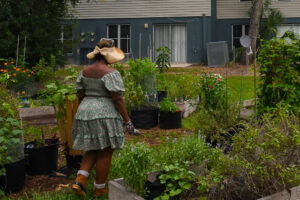
Rolesia Barton works in the community garden at the Meadows Apartments in Winter Park. Photo: Zoey Thomas
Barton’s small volunteer-based garden posed an easier target for assistance than Thompson’s community supported agriculture model, Sullivan said.
“A CSA is a group of people that contribute money for a farm,” he said. “It’s a real business operated with intensive labor and expense.”
Although Thompson’s idea never materialized, Sullivan looks forward to helping Barton with her her garden at The Meadows — a garden he didn’t know existed before she spoke up at public comment, he said.
The garden’s most pressing current needs include a fence to keep out critters and prevent theft; a better lighting system, so Barton can keep an eye on the plants at night; and a larger volunteer pool, maybe drawing from neighboring high schools. Sullivan offered to talk with city staff about making the requests happen.
All Winter Park Housing Authority buildings have community gardens, although none are as large as The Meadow’s, said Winter Park Housing Authority Interim Director Tarena Grant, who also attended the meeting with Sullivan.
Taking the lead on volunteering initiatives, especially ones that promote food security, helps tenants build self-sufficiency, Grant said. She asked Sullivan to look into also improving lighting at Tranquil Terrace and The Plymouth, two other Housing Authority properties, which both serve seniors.
“It’s about tapping into strengths of resident volunteers,” she said. “We look forward to working with the city … we’re open to however they see best to streamline the process.”
Barton, for her part, envisions a network among all Winter Park community gardens, she said. If one garden needed a specific plant or gardening tool, they could share among themselves — building community while doing so, she said.
Community gardens aren’t new to Winter Park. Our Whole Community, an organization of multiple local Christian churches including St. Margaret Mary and St. Mary Magdalen, has run a community garden just south of Depugh Nursing Center, off of Park Avenue, since 2010.
But the garden’s leader, Olive Mackey, 73, said the garden doesn’t produce enough food to feed a family — much less a community, as Barton hopes to accomplish with her own project. The Our Whole Community lot holds 21 wooden garden beds, which are rented out to individual gardeners in exchange for free compost, mulch and garden education events.
Mackey, a retired Department of Agriculture employee and UF Institute of Food and Agriculture professor, said community gardening benefits the spirit as well as the body.
“I don’t know anybody who has not felt good when they see something grow that they grew themselves,” she said.
The next step for the Winter Park Housing Authority garden will take place when Barton and her building directors meet with the city’s Sustainability Division July 24. With her garden’s future growing before her eyes, Barton said her only regret is not going to City Hall sooner.
WinterParkVoiceEditor@gmail.com
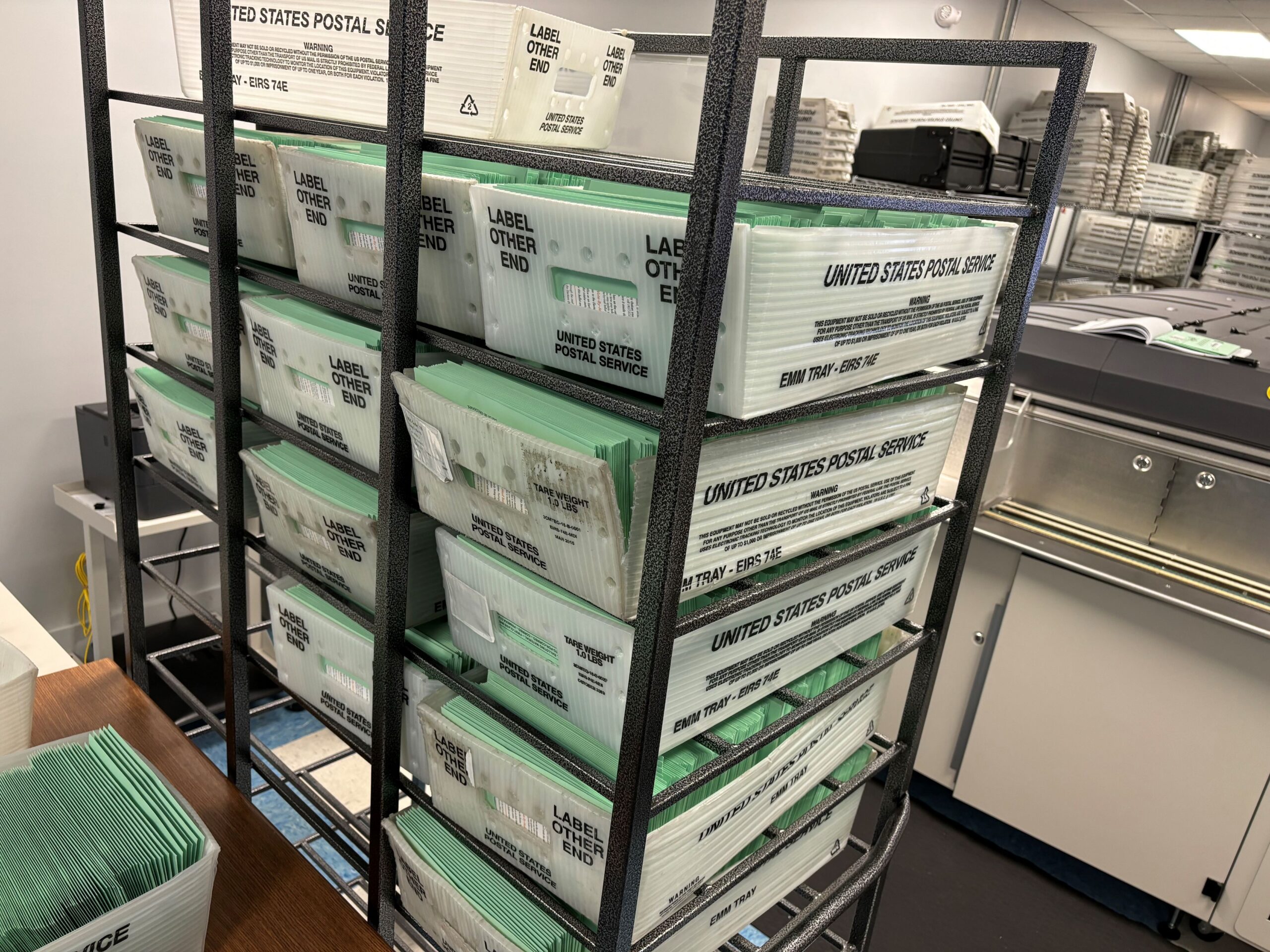
Your vote-by-mail request expired. It's time to request another
A state law that took effect in 2021 means that voters who want to cast a ballot by mail must make that request after each general election cycle
July 13, 2024
By Beth Kassab
If you haven’t requested your vote-by-mail ballot, the deadline to do so is looming.
Requests to cast a mail ballot must be made by Aug. 8 at 5 p.m. for the Aug. 20 primary election. The deadline to switch parties or newly register to vote in the primary is July 22. (For information about what will be on your ballot check the supervisor’s site here and the Voice’s race preview here.)
The Orange County Supervisor of Elections Office reports that it has received nearly 8,000 new vote-by-mail requests since late June for a total of 82,838 requests.
But that total is still less than half of what it was in 2022, according to the supervisor’s office.
Officials think this is because voters are still learning they must re-submit mail requests as a result of a 2021 state law that says those requests expire after each federal general election. That means previous vote-by-mail requests expired on Dec. 31, 2022.
“Thanks to the great work of our staff, we have already started processing vote-by-mail ballots for the primary and will be sending them out very soon,” said Orange County Supervisor of Elections Glen Gilzean in a news release. “While there is still plenty of time to request a vote-by-mail ballot, the deadline is now less than a month away.”
Gilzean is also reminding voters to update their signatures if they believe it could have changed due to age, injury or illness. Voters can find instructions on how to update their signature on the “Vote-By-Mail” section of the Orange County Supervisor of Elections website under “Signature Updates.”
WinterParkVoiceEditor@gmail.com